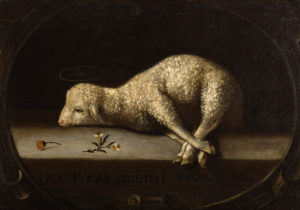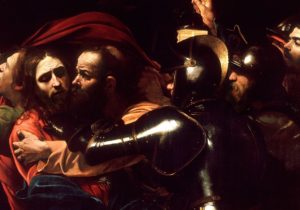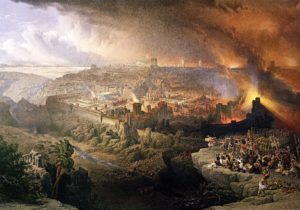Below is my response to Michael Doran’s fascinating “Theology of Foreign Policy” in First Things, the first of several responsive commentaries Providence will post this week.
Doran bracingly declares that American divisions over foreign policy are “primarily religious in nature—or perhaps ‘theological’ is the better word, for what matters in foreign policy, as in so many other aspects of American politics, are the religious divisions among Protestants.”
The primary division is between Protestant modernists and fundamentalists whose schism emerged over 100 years ago, Doran says. The latter emerged as a religio-political movement from populist Jacksonian democracy that was distrustful of Eastern cosmopolitan WASP elites and was rooted in the Scots-Irish dominated hinterland. These populists are unashamed American exceptionalists and nationalists who know God has special purposes for a free and independent United States.
These populists, as conservative Protestants who are often Calvinists and distrustful of centralized power, have low expectations of the state, are jealous of their liberties, and rest ultimate hope not in political reformation but Christ’s return. They incline toward premillennialism. When America and its liberties are threatened, they wage holy war but otherwise wish to be left alone and lean isolationist.
In contrast, modernist Protestantism, which evolved into secular progressivism, was postmillennial and downplayed human sin. Its Social Gospel optimistically assumed that political reform leads to righteousness and God’s Kingdom. These modernists were ecumenical and interfaith, internationalist, and confident of global collaboration leading to world peace and justice.
Their mission, Michael Doran notes, “is not Andrew Jackson’s notion of keeping the flame of liberty alive until Judgment Day. The mission of America is, rather, to use its military and economic power to nudge the world toward universal brotherhood.” These liberal Protestants and post-Protestants advocated a “missionary cosmopolitanism” and multilateralism that informed much of post-World War II foreign policy. They developed the United Nations and opposed Zionism, which Jacksonians respectively suspect and embrace.
For Doran, William Jennings Bryan, with his admiring Baptist Zionist disciple Harry Truman, embodies Jacksonian Protestantism. Meanwhile, his mocking critic H.L. Mencken embodies post-Protestant elitism, in alliance with the northern Baptist Rockefeller philanthropy that funded and informed twentieth-century liberal ecumenism and American internationalist foreign policy initiatives.
This story of Protestant theological divisions behind American foreign policy is, of course, more complex than one article can fully interpret, as Doran certainly knows. Hopefully, he is writing a book that will further elaborate in equally compelling terms. My brief response notes that this division is not completely binary, and an intersection between the two Protestant worldviews was embodied by the foreign policies of Teddy Roosevelt and his distant cousin Franklin D. Roosevelt.
Both Roosevelts might be expected to align neatly with northeastern liberal Protestantism. They were both New Yorkers and WASPS with Ivy League educations. Both identified as progressive. Teddy was a church-attending but theologically ambivalent Dutch Reformed moralist. FDR was a frequent, if not always church-attending, theologically broad but believing Episcopalian. But they actually both straddled the Jacksonian/elitist divide in ways that deeply influenced and still shape American foreign policy.
Teddy is considered the ultimate foreign policy realist who eschewed abstract ideals, unapologetically deployed hard power, and was a nationalist and exponent of unalloyed Americanism. The influence of his abolitionist Republican father, scion of old New York wealth, could have easily steered him into the liberal Protestant internationalist direction. But his mother was a Georgian whose brothers fought for the Confederacy. Teddy himself was deeply shaped by his Wild West adventures in the Badlands of the Dakotas. His Spanish-American War experience amplified his crypto-imperialism.
An exponent of muscular Christianity who wrote an admiring biography of Oliver Cromwell, Teddy disdained armchair moralists like William Jennings Bryan and Woodrow Wilson. His final years were waged in combat against Wilson’s initial neutralism in World War I and later against Wilson’s expansive global vision through the League of Nations. “The professional pacifist and the professional internationalist are equally undesirable citizens,” Teddy unsurprisingly intoned.
Teddy’s vitriolic hostility toward Wilson never impaired his relations with Wilson’s prominent assistant secretary of the navy, FDR, who was also husband to Teddy’s niece. Young FDR likewise disdained Wilson’s pacifist secretary of state, William Jennings Bryan, and disagreed with the similar pacifism of his boss, Navy Secretary Josephus Daniels. (Inconsistency among Christian pacifists was not then uncommon; Bryan had volunteered for the Spanish-American War.) Bryan, a Nebraska Presbyterian, and Daniels, a North Carolina Methodist, embodied the Jacksonian conservative Protestant spirit that Doran describes. Both were also allies in the Prohibition movement.
FDR plotted with Teddy to get America into WWI, against the neutralism of Bryan and Daniels. Having modeled his own career on Teddy, who was a similarly assertive assistant secretary of the navy at the start of the Spanish-American War, FDR was a lifelong enthusiast for American sea power. His lifelong perspective on the imperative of American strategic global reach, although carefully couched in diplomatic public language, was fairly close to Teddy’s and fairly Jacksonian. Both FDR and Teddy tried to gain combat appointments when America finally entered WWI, but Wilson rejected both, trusting neither.
As the 1920 Democratic vice-presidential candidate, FDR obligingly supported the party’s promise to vindicate Wilson’s League of Nations, whose doom Teddy’s pal Henry Cabot Lodge had ensured in the Senate. But FDR had learned a great deal from Wilson’s League fiasco that would inform his future actions. As president in the 1930s, FDR both waved the progressive banner of Wilson while also catering to the Jacksonian constituency upon which the Democratic Party depended. He espoused pacifist and neutralist banalities, even as he prepared for war.
FDR’s vision for a United Nations, contrary to the soaring dreams of its liberal Mainline Protestant supporters whom Doran rightly recalls, was permeated with his view that great powers led by America must enforce world order. His cold pragmatism with a smile replaced Wilson’s preachy idealism. Wilson was the son of a Presbyterian minister and president of a Presbyterian college who lived in the abstract. FDR, as the shrewd survivor of hardball New York politics, had little private use for abstractions. He assumed world peace and security for American democracy ultimately relied on American wealth, power, and the smart deployment of both. He often spoke like Wilson, but he thought more like Cousin Teddy.
In 1944, FDR dropped his vice president, the dreamy pseudo-Presbyterian mystic Henry Wallace, in favor of Harry Truman, a fellow survivor of hard-knuckle machine politics. Like FDR, he instinctively believed in the necessity of American power. His use of atomic weapons against Japan to end WWII was classically Jacksonian. But his founding of NATO and the wider web of Cold War alliances overlapped with the multilateralism of the northeast liberal WASP establishment, as embodied by his secretary of state, Dean Acheson, the son of an Episcopal bishop. The Cold War stitched together missionary zeal with Jacksonian cold steel.
This steely internationalist consensus mostly persevered until the Cold War ended, when Pat Buchanan’s insurgent 1992 campaign against President George H.W. Bush resurfaced unalloyed Jacksonian nationalist themes, foreshadowing later Trumpist rhetoric. That rhetoric aside, actual US foreign policy today arguably still heeds the example of the Roosevelts, projecting sustained power through alliances and multilateralism when advantageous.
Like Teddy, FDR imbibed in his youth Victorian-era muscular Christianity, not the later Social Gospel Protestantism he knew in his maturity. He learned it from his Groton headmaster Endicott Peabody, a savvy Episcopal priest who taught the sons of America’s elite at Groton for over 50 years, from the time of Indian Wars in the West until WWII. FDR hailed him as his greatest influence after his parents and quoted him in his 1944 inaugural address, saying the “trend of civilization itself is forever upward.”
That quote may sound like Protestant modernism but it was a faith in Providence, not humanity. At the close FDR sounded semi-Jacksonian and decidedly exceptionalist:
The Almighty God has blessed our land in many ways. He has given our people stout hearts and strong arms with which to strike mighty blows for freedom and truth. He has given to our country a faith which has become the hope of all peoples in an anguished world. So we pray to Him now for the vision to see our way clearly—to see the way that leads to a better life for ourselves and for all our fellow men—to the achievement of His will to peace on earth.
FDR reflected a hybrid of Protestant crosscurrents that still informs America’s self-understanding of its role in the world. Kudos to Michael Doran for robustly addressing this usually neglected topic. As he notes, the supposed secularism of today often masks a mosaic of theologies.







 Sponsor a student for Christianity & National Security 2024
Sponsor a student for Christianity & National Security 2024